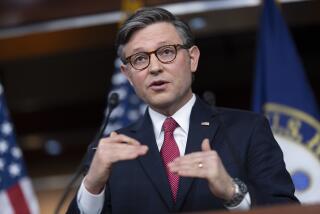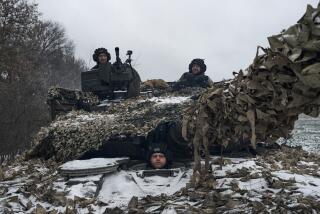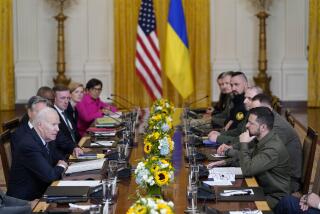U.S. May Expand Aid to Colombia
- Share via
WASHINGTON — Secretary of State Colin L. Powell said Wednesday that the Bush administration might ask Congress to lift long-standing restrictions that limit U.S. military aid in Colombia to the fight against narcotics.
Powell’s remarks, a shift from the administration’s previous statements, came as Congress also showed signs of changing its view and favoring more extensive involvement in the violence-racked Andean nation.
Appearing before a House subcommittee, Powell said that the Colombian government’s decision in February to break off peace talks with rebel groups had changed the situation and that the administration wants to do more to help its ally amid an intensifying civil war.
“We will have to readjust our policies, take a hard look at what we’re doing and see if there are not other ways we can help Colombia protect itself, short of the United States armed forces going in to do it,” Powell said.
“It may be necessary for us to give the government of Colombia assistance that is outside the counter-narcotics [activity] in order that they are able to deal with this threat to their survival as a nation,” he added.
For weeks, the Bush administration has been in the midst of an internal debate over whether to widen its role in the three-sided war that pits a weak Colombian army and growing right-wing paramilitary forces against two large leftist groups.
The reappraisal has come during a period of escalating violence. The rebels have kidnapped national political figures, hijacked an airplane and bombed important utility installations.
Some American officials have argued for increased assistance to help the Colombian government combat what they view as a terrorist threat that endangers the United States. Some have called for declaring the destruction of the rebel groups an explicit goal of U.S. policy.
But others, fearing that the four-decade war could become a Vietnam-style quagmire for the U.S., have argued for a more cautious approach. State Department officials have, until now, lined up on the side of a more limited role.
Just last month, Powell spoke with caution about the U.S. commitment. He said American officials wanted to spend additional money to help protect a large Colombian oil pipeline, but intended this to be done through a “passive,” or defensive, approach.
And President Bush told reporters last week that the administration did not intend to move beyond the policy that strictly limited U.S. military aid to counter-narcotics activities.
“We are providing advice to the Colombian government as to drug eradication, and we will keep it that way. The law is very clear,” Bush said at the time.
But on Wednesday, the House of Representatives passed by voice vote a nonbinding resolution inviting Bush to seek broader aid for Colombia.
“It is time to help the Colombian people help themselves,” said Rep. Henry J. Hyde (R-Ill.), chairman of the House International Relations Committee and a longtime supporter of greater aid to the South American nation.
Some longtime critics of U.S. aid to Colombia also have indicated that their view of the war may be changing.
Sen. Patrick J. Leahy (D-Vt.) has said that he has an open mind about broader U.S. military involvement in Colombia, although he believes that the administration should continue to require that the Colombian government do all it can to uphold human rights.
The U.S. has provided Colombia with about 75 helicopters as part of its aid package. This year, the administration has proposed spending nearly $600 million for counter-narcotics training and $98 million to teach a new Colombian army brigade to protect the oil pipeline.
However, the Pentagon has been limited to providing no more than 400 military personnel to train the Colombian army and is barred from sending U.S. troops into combat.
More to Read
Sign up for Essential California
The most important California stories and recommendations in your inbox every morning.
You may occasionally receive promotional content from the Los Angeles Times.














